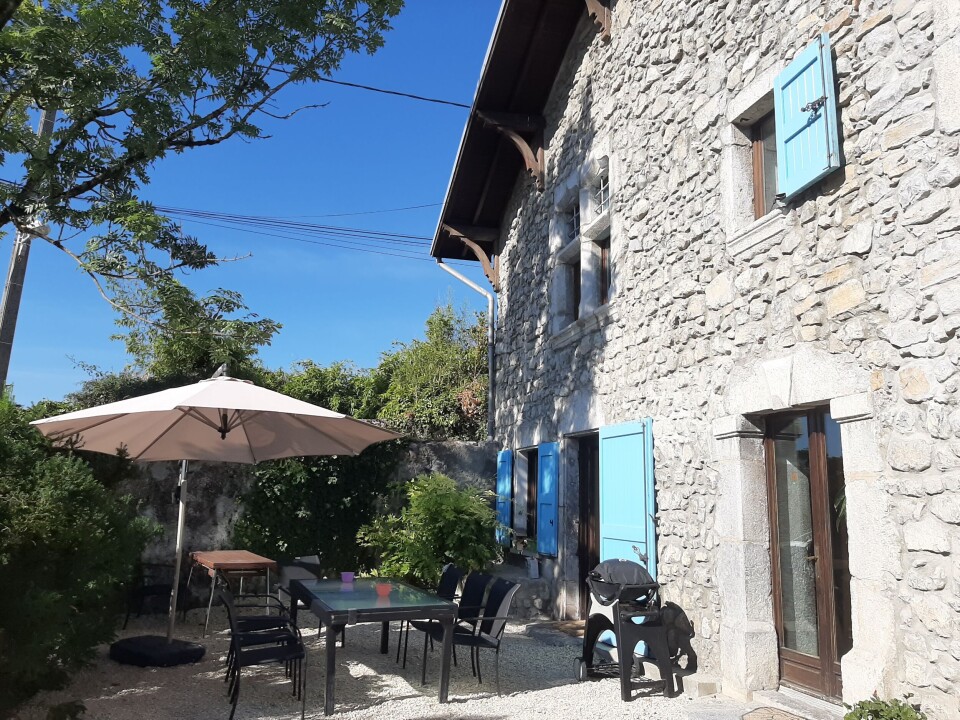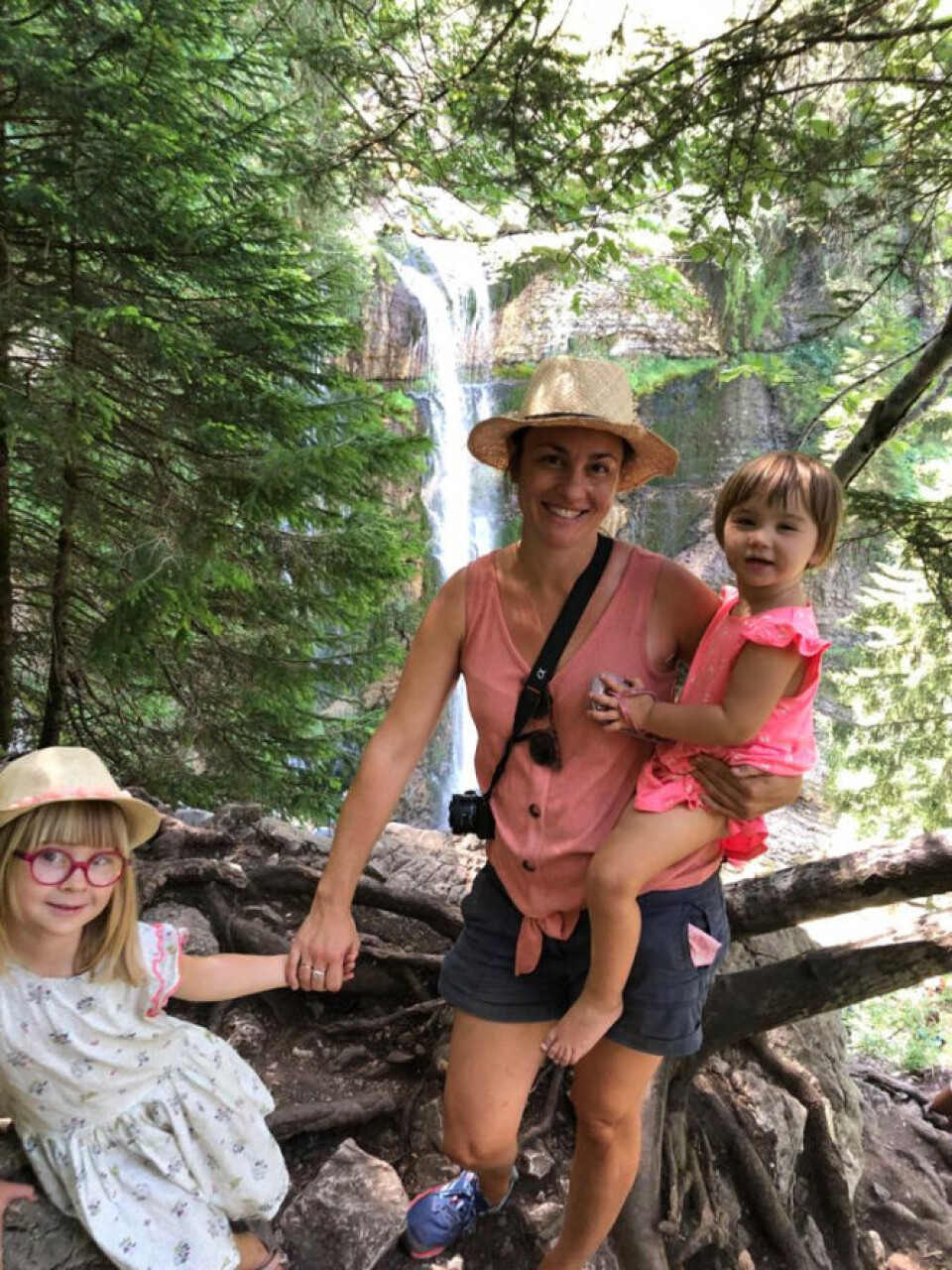-
Exploring France by canal boat: routes, prices and beginner advice
Slower pace lets holidaymakers enjoy the scenery
-
Rugby vocabulary to know if watching the Six Nations in France
From un tampon to une cathédrale, understand the meaning of key French rugby terms
-
Sleep in a 100-year-old railway carriage at a former Brittany station
Refurbished railway compartment can sleep up to 11 people at a time
House swapping in France gave us a dream family holiday in Grenoble
As the cost of living crisis continues to bite, Chrissie McClatchie talks through a low-cost holiday solution

My husband and I packed up our trusty Citroën C4 and, along with our two young daughters and cat, set off from our home in Villefranche-sur-Mer in Alpes-Maritimes for a three-week holiday in the Isère.
Our destination was a period-style, three-storey, six-bedroom stone dwelling dating from the Renaissance in Biviers, a satellite commune just outside Grenoble at the base of the Chartreuse mountain range.
Read more: French property watch: More new builds than bargains in affluent Isère
It was two summers ago – and one of the best holidays we have had: after months of lockdown when we worked and homeschooled together inside our 62m² flat, the space was an incredible luxury.
In the morning, we would throw open the glass bi-fold doors and sip coffee while the girls giggled on the trampoline.
Then, we would pile in the car and head up into the Chartreuse to cool down in waterfalls and tackle summits with views towards Mont Blanc.
Each day ended with a meal, most often a barbecue, in the garden.
The soundtrack to those summer evenings was the gentle bleating of a pair of sheep in the neighbour’s field.

‘...the cost - or should I say, the lack of it’
What made the experience even more enjoyable was the cost – or, should I say, the lack of it.
Despite holidaying in the middle of July, our accommodation was free.
Nearly 500km away, the owner of this property was staying in our home. We were on our first house swap.
House swapping is nothing new. HomeLink, the website we used to organise our exchange, was established as far back as 1953.
Since Covid, however, the concept has grown in popularity.
As purse strings tighten with rising energy prices, house swaps are also a smart solution for travel during the current cost of living crisis.
However, not all our family and friends shared our enthusiasm for the idea.
“Aren’t you afraid of a stranger going through your belongings?” they asked. For us, this was simply not an issue.
Plus, we only had to think how much we were saving on high-season accommodation rates to be reassured we had made a good choice.
Alongside the obvious financial incentives, there are many other advantages to house-swapping.
‘Ticks all the boxes’
Lilli Engle, HomeLink’s France representative of the past 35 years, said: “It really ticks all the boxes – it’s a sustainable way of experiencing local culture and local people, allowing you to get off the beaten track, stay longer and travel less.”
When we first decided to explore the possibility of a house swap, we did not have a wish list of destinations.
Instead, we were quite open to the opportunities that came our way – an outlook Lilli credits with the “serendipity” of platforms such as HomeLink.
“That’s the difference between us and Airbnb,” she says.
“You might think you want to go to Spain, but you get an offer from Italy and end up discovering your house swap soulmate.”
After paying the €150 annual fee to sign up on HomeLink, I created a profile, uploading photos of our flat and writing a short description of our home and neighbourhood, and the dates we were interested in travelling.
Browsing listings in Tuscany or Andalucía was a dreamy distraction in the January rain.
And, it would seem, I wasn’t the only one getting summer plans sorted out early – many swaps are agreed six to nine months beforehand.
Soon after the listing went live, I started receiving messages.
Despite the size of our flat, I suspected our location, especially our proximity to the beach, would be an asset, and I wasn’t wrong.
Offers to swap from the UK, Denmark, Germany, the US and even down the road in Cannes had us mentally taking off for different parts of the world every few days.
French home passport to discovering the world
“Supply and demand statistics are heavily in France’s favour,” Lilli says. “So your home in France really is your passport to discover the world.”
In the end, we decided to play it safe and stay within a comfortable driving distance – a decision that paid off that summer as Covid was still making travel complicated.
Our exchange partner in Grenoble was a 40-swap veteran who was happy for us to bring our cat along.
We were sold on the photos of her garden with its outdoor playhouse and swing set. Plus, it was a part of the country we had only ever seen from the autoroute.
In February, after discussing details such as dates, number of guests, and arrival and departure plans, we signed an exchange agreement on HomeLink’s website to formalise the deal.
‘It’s about mutual respect’
“Reciprocity is the secret of success for house-swapping,” Lilli says. “It’s about mutual respect.”
The understanding is that you will treat the other person’s home exactly as you want them to treat yours.
With it being our first swap, we had few expectations or plans – apart from collecting the keys from neighbours down the road.
The girls squealed with excitement at the sight of the garden as we drove through the gates.
My initial reaction was more muted: the house was enormous and if we did not wish to spend our holidays cleaning, we would need to close off certain parts.
HomeLink’s ‘Ten Principles for a Successful Home Exchange’ recommends having a welcome gift and ingredients for the first night’s meal for your exchange partner – a welcome touch after a day on the road.
We also found handy explanatory notes stuck all around the house and a corner in the lounge room doubled as a tourist information office.
Unfortunately, our exchange partner had not divulged that her road was being dug up that summer.
Some mornings we woke to machinery parked outside our gate.
Yet, it did not feel part of the house-swap spirit to complain, so we did not press the issue with her.
In the first few days, both my husband and I struggled to settle, constantly on edge that the girls would break a family heirloom or spill something on the carpets.
Then, unconsciously, the worry slipped away and we slowly relaxed into the rhythm of our holiday.
After a flurry of messages with our exchange partner upon arrival (How does your dishwasher work? Where’s the safest place to park my car?) we left each other alone, only texting when really necessary – in our case, to break the news that one of her fish had died.
As we approached the end of our time in Grenoble, we agreed we would definitely do it all again.
Are house swaps for everyone?
“If you are looking to visit a busy city centre at a specific time, then a home exchange might not be for you,” Lilli says. That, I guess, is the catch.
The following summer, despite lots of back and forth with potential exchange partners, including serious discussions with a couple in Switzerland, we did not end up organising a house swap.
We could not find dates to match in locations that appealed to us.
Last year, having just purchased a holiday home in the Lot, we did not renew our HomeLink membership.
However, second homes are ideal for more flexible swaps that are not dependent on exact date matches.
So, once we have fixed up the bathroom and put in a new kitchen, I will be rejoining to list our house in the south west alongside our flat on the Côte d’Azur.
Read more: Where does the South of France start? Tourism offices share thoughts
Who knows where the home exchange serendipity will next lead us?
Related articles
Normandy wins ‘most desirable region’ for British tourists
The French tourist cities taking a stand against Airbnb-style lets
Protests against second homes in Brittany as housing debate continues
























